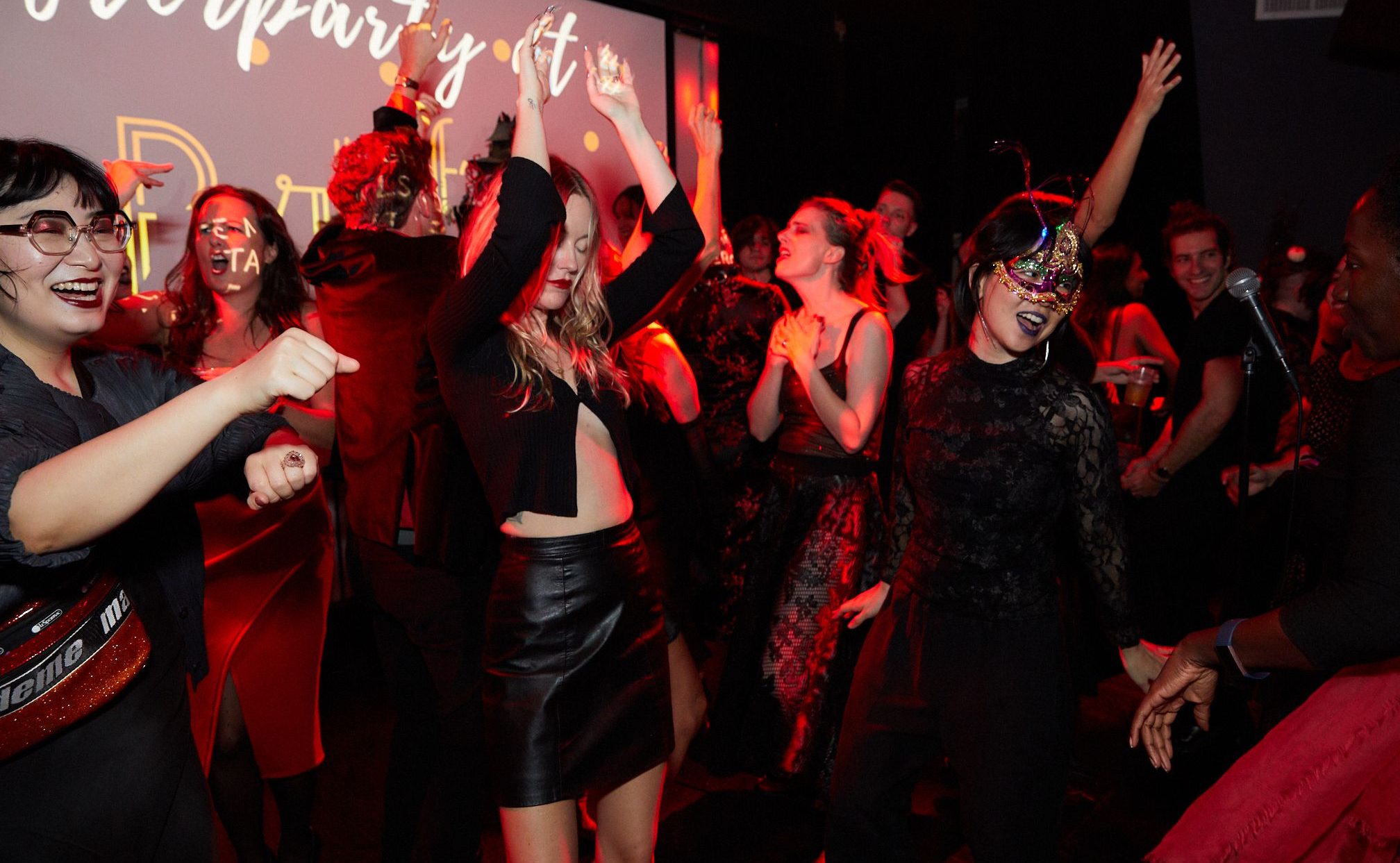news
MEGA BROOKLYN BOOK FEST SMASHDOWN!
Th

This weekend saw the sixth annual Brooklyn Book Festival, which took place in downtown Brooklyn. Over 260 writers were featured in the panels and readings, not to mention the hundreds of booths occupied by literary mags and publishers. In addition to the Book Festival itself, this year’s celebration was expanded to four days and included “Bookend” events at venues throughout the borough, including BAM, BookCourt, Brooklyn Bowl, Brooklyn Winery, Greenlight Bookstore, and powerHouse Arena. Of course, such an event made for ideal Dishing, and therefore we unleashed a team of bloggers on the unsuspecting literary world. Below are our collective experiences of the Book Fest’s big day, and you can see our coverage of Bookend events here, here, and here.
1. Authors David Goodwillie (American Subversive), Justin Taylor (The Gospel of Anarchy) and Amanda Bullock, Events Coordinator for Housing Works, fresh-faced before the morning panel. 2. Book Festival participants Carol and Lynne ponder their next move.
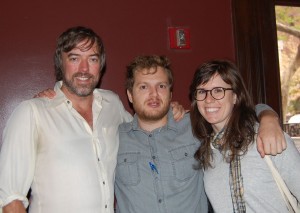
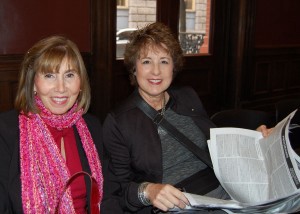
1. Moderator Marcela Landres, whose moderating duties also extended to a 3 o’clock panel entitled “Changing the Lens.” 2. Author Nine Revour, poet Kyoko Kchida, and Pedro Barbeito, husband of Jennifer Gilmore, chat before the reading begins.
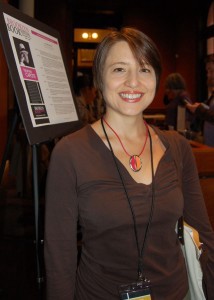

11:00 A.M. Presented by Housing Works Bookstore Cafe: Radical Fictions.
When attending a panel on Radical Fictions, one might imagine the tattoos and scavenged attire of the impassioned punks from their youth. But Jennifer Gilmore (Something Red), David Goodwillie (American Subversive) and Justin Taylor (Gospel of Anarchy) all arrived clean, neatly coiffed and rather subdued. As moderator Marcela Landres explains, “It’s surprising how traditional they are — their work has a focus on family, food, religion, spirituality.” In fact, the readings revealed protagonists whose radical tendencies are nurtured and encouraged over time, seeds of rebellion brought to the surface by circumstances. As Gilmore writes in Something Red, “Sharon was no revolutionary. She knew that now, yet she had tried.”
While all of the authors read beautifully (so much so that my first post-reading move was to collect all three novels in rapid succession), it was the incredibly young-looking Justin Taylor who captured the current attitude of personal, confined rebellion with a wizened expertise. Although his novel is set in 1999, the modes of revolution described seem not to have changed — to remove oneself from the system, rather than attempt to change it. “They already lived outside the capitalism’s kingdom, in the gutter that ran along the base of its fortified wall, not beyond but below the field of it’s vision– except of course when they got caught stealing, but they were pretty ace thieves by this point.”
While pretty much all of the Brooklyn Book Festival participants are a part of “the system,” there is no better way to exercise those leftist tendencies than these three works of fiction. (SL)
1. Nelson George and Mary Karr get their sign on. 2. The Tokens perform The Lion Sleeps Tonight on the Main Stage.


11:00 Mary Karr and Nelson George in Conversation
While Mary Karr (Lit: A Memoir) is always a badass, she was particularly on top of her game at Sunday’s Brooklyn Book Festival. The courtroom was packed with fans who wanted to listen in on her discussion with music critic and author, Nelson George (The Plot Against Hip Hop), in a conversation that was supposed to be moderated by Tim McLoughlin (Brooklyn Noir), though Karr completely stole the show.
Mary Karr and Nelson George are good friends, so listening to them was like eavesdropping on a boisterous couple at a bar. Their conversation was centered on the role of music in their writing, and ranged in subject matter from James Brown and Mick Jagger to Hemingway and Miles Davis. Here are some highlights:
– Karr claims she is a poet because she wasn’t talented enough to be a singer. Her childhood voice teacher advised her, “I don’t have enough time and you don’t have enough money.”
– Similarly, George is a music writer because he failed at music. He realized he should be a music critic when he read a Rolling Stone review of a George Brothers album and the writer “didn’t have a sense of rhythm and had no idea what he was talking about.”
– Karr writes songs and is soon releasing an album. “The guys I used to date in high school all went to prison.” Her song lyrics reflect her taste in men. A sample: If you ain’t chuggin’ your paycheck, you’re not huggin’ on my neck.
– The Great Gatsby is one of George’s inspirations. He thinks NYC is a town of Gatsbys, and cites Jay-Z as an example.
– Karr is writing a TV pilot for her memoir, Lit, which she decided to do after she noticed Kathy Griffin’s book was higher than her own on the bestseller list. “I thought, I know what I’m gonna do to sell books — I’m gonna write a shitty TV show.”
– George and Karr recommend watching The Wire and Friday Night Lights. (LD)
1. Marissa Lerien, Book Court employee, and Guy Anglade (that’s “Gi,” French-style), Assistant Fiction Editor of Book Court’s lit. mag., Cousin Corinne’s Reminder, sell books and charm passersby outside Poetry of Loss. 2. Michael Dickman, Meghan O’Rourke, Kevin Young (not as bored as he looks — maybe just sad?), and moderator Robert Casper listen as Mary Jo Bang reads.


12:00 P.M. The Poetry of Loss.
Poets Kevin Young (editor of The Art of Losing: Poems of Grief and Healing), Mary Jo Bang, (Elegy), Meghan O’Rourke (The Long Goodbye), and Michael Dickman (Flies) discussed the poetry of loss. Young kicked things off by thanking us for coming out to discuss grief in the morning. Funny ha-ha, meet funny strange. Then everyone broke our hearts. After leading with Auden’s “Funeral Blues,” Young read a poem about his father’s death. Nonetheless, Young’s a restrained guy. Addressing the contemporary popularity of the elegy, he said, “We just passed a big anniversary.”
Next, Bang noted how bewildering it is that “these private utterances that we make in moments of great distress actually mean something to other people.” Amen. O’Rourke focused on the atemporal fact of grief, and how that makes poetry especially suited to loss. Dickman quoted Franz Wright, insisting, “We write what we’ve been given to write,” but also noted that he certainly would have liked to have written a book about, say, trees, instead of his brother’s suicide. And everyone read compelling poems. O’Rourke perhaps summed things up the best: “Grief is irrational and poetry is irrational.” (SP)
1. An over-caffeinated Chuck Klosterman gesticulates wildly. 2. Sam Lipsyte reads a novel excerpt about breast-feeding.

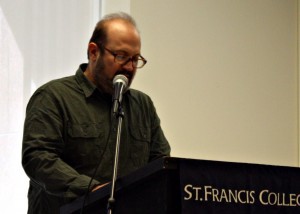
12:00 P.M. Epic Confusion
Sam Lipsyte, Chuck Klosterman, Nadia Kalman, and Tiphanie Yanique accepted an insurmountable task: stir up laughter at noon on Sunday. Yanique introduced the well-decorated authors of the Epic Confusion (read: comedic) panel at the Brooklyn Book Festival, including herself, noting, “I’ve won all sorts of shit.” Later, after she cursed again, a baby cried, and she responded by covering her mouth and saying, “Oh shit, there’s kids in here.”
During the Q&A, Lipsyte said he creates confusion in his books by having characters talk past each other, one or both parties oblivious, simply exchanging vitals. He compared the process to an actor playing a drunk by trying to pass for sober.
One gentleman raised the seemingly obligatory ‘What is your writing routine?’ question. Klosterman replied that he wished his routine involved waking up at 5am, smoking three cigarettes, and blasting Metallica’s seminal album ‘…And Justice For All,’ just so a sucker would attempt it. When another asked when the authors felt as though their novels were finished, Nadia Kalman responded that she went through fifty-two drafts of her novel, The Cosmopolitans, which left Klosterman dumbfounded. “Fifty-two? Like you typed it out fifty-two times?” Kalman conceded it involved plenty of copying and pasting. Lipsyte replyed, “I never finish. I simply look away in disgust.” As I do now. (PG)
1. Karen and Katherine, writers and readers waiting in line for the Apocalypse. 2. Anayah Sangodle-Ayoka with her son Sangojobi, here for Tanarive Due. 3. The line for the discussion wrapped around Borough Hall.



1:00 P.M. Apocalypse Now, and Then What?
Is there anything as hip as the apocalypse, these days? You wouldn’t think so when you saw the line that formed at the Brooklyn Book Festival for their Apocalypse Now, and Then What? panel. Granted, with Paul Morris (BOMB Magazine) and Colson Whitehead (author of Sag Harbor and the forthcoming Zone One) involved, a crowd can be anticipated. Participating authors Tananarive Due (My Soul to Take), Patrick Somerville (The Universe in Miniature in Miniature) and Whitehead all read passages from their novels that deal with life after it all ends. Due proved to be a somewhat funny choice — her books deal more with supernatural elements such as immortals and telepathic abilities (Whitehead’s newest work, Zone One, may deal with zombies, but it still doesn’t stray nearly so far from his well-crafted, realist fiction). However, I for one am always a big fan of the Book Festival’s unusual combinations (just as the feminist in me always longs for more females up on the stage). Leave it to a bunch of nerdy, brilliant contemporary authors to give the public something else to worry about when disaster comes. (SL)
1:00 P.M. Walker in the City
Americans are not inclined toward walking. We know this from our longstanding reverence for the automobile, and the more recent alarming expansion of the national waistline. This may explain why not one of the three authors featured at the 1 p.m. “Walker in the City” was American born. Or that could be reading too much into it.
Moderator Edmund White introduced the authors. They were, in order of readers, British writer Geoff Nicholson (The Lost Art of Walking) Argentine writer Sergio Chejfec (My Two Worlds) and Teju Cole, a Nigerian writer and art historian whose much-lauded Open City came out earlier this year.
Their work illustrated some good of walking. Nicholson described the time he went out for a stroll in Los Angeles and came upon a pre-pubescent bottle blonde who turned out to be a full-grown Christina Ricci searching for her lost dog. The walks Cole’s narrator takes through New York give readers “a new set of glasses to see the city,” as White put it.
But the connection between writers and walking may have more to do with the solipsism of those of us inclined to linger in our own head while moving our feet, best captured in Chejfec’s book. His narrator, at life’s crossroad, finds himself “unpersuaded” by life’s many ideas, “incapable of believing almost anything.”
“Given such failings,” he says, “I had no other choice but to walk, which most resembled the vacant and available mind.” (LRS)
1. Owen Bamp, of Stern Literacy Management, and Daisy Solis, artist, in the front of the line. 2. Panelists Tanarive Due, Patrick Somerville and Colson Whitehead in discussion.
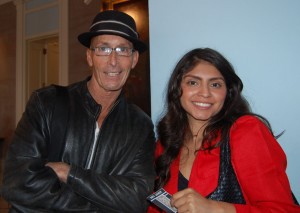

1. A brightly-lit Jonathan Safran Foer talks with a radiant Joyce Carol Oates as Nina Revoyr chats with moderator Brigid Hughes.

2:00 P.M. Worlds of Personal.
Jonathan Safran Foer, Joyce Carol Oates, and Nina Revoyr read to a full St. Francis Auditorium, under the billing, “Worlds of Personal,” which I guess means “Great writers available at the same time, some of whom have mentored each other.” No matter. The connecting theme was really that they were all kickass readers. Foer read, “Here We Aren’t, So Quickly,” his story for The New Yorker’s “20 Under 40.” He had not yet read it aloud. Ever? Not sure. The story is a feat of collapsed time, taking on the joys and disappointments of domestic life. You could probably collapse it further into one of its lines: “I was always struggling to be natural with my hands.” Although, “I wouldn’t congratulate a woman until she explicitly said she was pregnant,” got a nice laugh from the audience.
Next, Nina Revoyr read a selection from Wingshooters, which was rather beautiful and fresh, despite being composed of hunting, grandpas, and baseball. What’s with baseball, lately? Anyway, Revoyr described hitting a ball as, “creating your own crack of thunder,” and fielding one as, “catching a bolt of lightning.” I dug it.
Joyce Carol Oates was last. I’d never seen her read, and she was just as ghostly and small as I had been led to expect. But funnier than I had anticipated: “This story is a little long — maybe I’ll just read it very rapidly.” She read, “I.D.,” another New Yorker item, and there was something touching and strange about seeing her read it off pages torn from the magazine. They weren’t even stapled. The piece itself is killer: a thirteen-year-old girl is drawn out of school to identify her mother’s body in the morgue. When Oates got to the part when the girl sees the body — beaten and wrecked almost beyond recognition — she…she…was she crying up there? Or that much in character? I nearly had a panic attack. (SP)
1. Russell being adorable. 2. Shepard charming the audience. 3. The panelists: Jim Shepard, Karen Russell, & Elissa Schappell. (Rob Spillman was at the mic.)

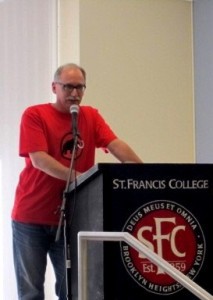
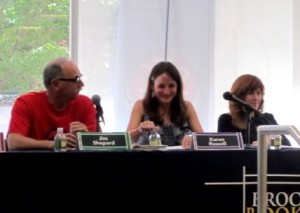
2:00 P.M. Dangerous Laughter.
It felt like some kind of “Best of” list come to life at McCardle Hall. The crowd zoned in on empty seats like hawks, and then soon resigned to the ground and aisles. It was noisy and chaotic in there, but everyone shut up once writers Jim Shepard, Karen Russell, Elissa Schappell, and host Rob Spillman got on stage. Elissa Schappell, introduced as a “fiction diva” by her husband, told us that she felt like this gave her license to “behave really badly.” But, of course, she behaved beautifully, and read an excerpt from “The Joy of Cooking.” Karen Russell said she felt honored to be reading with two of her favorite writers, and then read part of “A Family Restaurant,” which is forthcoming from Conjunctions. Spillman introduced Shepard by saying that he would follow him anywhere… including to suburbia (scary), which is the setting of Shepard’s reading, “Boy’s Town.”
Although there was no discussion panel for this event (boo — they’re all amazing and I’d love to hear each of them discuss pretty much anything), it was still a great way to spend the hour. All three of the writers have excellent reading skills, and it was nice to see how each of their brands of wry humor overlapped and informed the others’. But perhaps most enjoyable was witnessing the camaraderie between all the panelists; it was clear that each respected, and, more importantly, liked, the other readers. In sum, it was exactly the kind of reading that makes the Book Festival so special. (JJ)
2:00 P.M. Brooklyn Book Festival honors Jhumpa Lahiri
During what Brooklyn Book Festival organizer Johnny Temple described as “our premier event,” Jhumpa Lahiri (The Namesake) was recognized as the 2011 Best of Brooklyn, Inc. Award winner for writing a body of work that exemplifies the spirit of the borough.
In a conversation with book critic Liesl Schillinger, Lahiri described how she got her start as a writer and how her academic father came to understand her artistic career choice. She also explained what happened when her first New Yorker story, “A Temporary Matter,” was published.
“I was riddled with nightmares for a week before the issue came out.” On the day the magazine was supposed to be in stores, Lahiri couldn’t find a copy anywhere and began to think it hadn’t been published after all. She became so frantic that her agent had to describe the way the story appeared on the magazine’s pages over the phone.
As a reward for the many audience members in attendance at St. Ann and the Holy Trinity Church, Lahiri read from the recently completed first draft of her next novel. The book is a project she’s been working on for the last fourteen years, and is inspired by a story her father told her during a walk many years ago in Provincetown. (LD)
1. Lynne Tillman on the LES the day of OJ Simpson’s white van chase. 2. Tayari Jones comments on researching one’s own city, particularly Atlanta’s Peyton Road wall.


3:00 P.M. Starring: the City.
While waiting in line for a panel called “Starring: the City,” all I could think about was how adorable Edmund White looked as he walked into the Screening Room at St. Francis College. At this year’s Brooklyn Book Festival, White was joined by Lynne Tillman (American Genius: A Comedy; Someday This Will Be Funny) and Tayari Jones (Silver Sparrow) to discuss the city’s role as a character in their works. Moderated by Felicia Price (who, when finally coerced by White, broke from her moderator niche talk about Baltimore), the writers discussed the use of their respective cities as a framing devices for their narratives. Jones opened with a reading from Silver Sparrow (Atlanta), and Tillman and White read from No Lease on Life and City Boy (New York for both). Tidbits to take from the session? Gays move to derelict neighborhoods, fix them up, and are priced out by young, ambitious heterosexual couples. Also, cities other than New York are closely-nit. Take Atlanta as depicted in Tayari Jones’s Silver Sparrow. Dana and her mother, Gwen, are, in effect, the secret family of a bigamist in Atlanta. Were they in New York, they could live their lives freely. They’d have neighbors downtown, and nobody would even think to connect them to another family. But in a place like Atlanta, everyone knows everyone, and the two must remain isolated to protect their secret. And as Tillman described, New York is a city that will always be in flux. But, and I shrug benignly here, hopefully rent stabilization will keep our neighborhoods from one day becoming truly unrecognizable. Whatever the trait, the characterized city has been woven into the collective literature for years, and it’s bound to continue from here on out. (JZ)
1. Edmund White on 1960s-era actor/waiter armies in the West Village. 2. Edmund White wryly coerces Felicia Pride from her moderator niche.


1. Pete Hamill, author of Tabloid City, chats with an old friend at the main stage.

3:00 P.M. Urban Underbelly
I understand why some people can’t roll with the mystery genre. I just think they are fools. Why wouldn’t you like literature that mingles loneliness and Tommy guns, where self-knowledge comes through encounters with Glocks, or 6’ 3’’ drag queens who perform cabaret?
But for all its heavy weaponry, mystery writing really is, and always has been, about place, which became clear all over again at the 3 p.m. “Urban Underbelly” reading featuring Pete Hamill (Tabloid City), Mukoma Wa Ngugi (Nairobi Heat) and Persia Walker (Black Orchid Blues). The aforesaid weaponry and womanly types appeared in Ngugi’s book, set in Nairobi, Kenya, and Walker’s, which unravels in 1920’s Harlem. Hamill, a former New York City reporter sporting black leather ankle boots, took a more philosophical approach.
The requisite murder (or two, in this case) come early in Tabloid City, but “It’s not all about the murders,” he said. “It’s about what you do at two o’clock in the morning, and who you are when you’re alone.”
The years he spent reporting, particularly in New York, give texture to Hamill’s work. The city has been “a blessing to me as a writer,” he said. But Hamill does something in Tabloid City he said he never could as a journalist — delve into who we are when no one is watching. “Even when people tell you about their alleged interior lives, sometimes they lie,” he said. Only when we make it up can we be sure it’s true. (LRS)
1. Moderator Marcela Landres, with writers Keli Goff & Simon Van Booy.
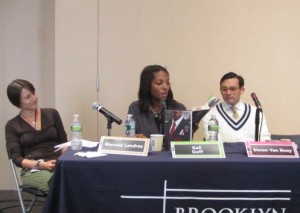
3:00 P.M. Changing Lenses.
At 3pm, Ben Lerner was still nowhere to be found — he was supposed to be on this panel, but he ended up cancelling (bummer). Keli Goff (The GQ Candidate) and Simon Van Booy (Everything Beautiful Began After) carried on, and each read a brief section from their new novels. After Van Booy finished reading, moderator Marcela Landres, obviously enchanted by Van Booy’s accent, asked him if there was an audiobook available with him reading. (Thankfully, there is.)
Landres pointed out that the two readers were very different from each other — Goff is “grounded, so contemporary,” while Van Booy is “so romantic” — but they’re both coming from more or less the same place: their first novel. Both writers spoke about the surprises that emerge when writing a novel, and uncertainty in their success at the form — although I don’t think either of them should be worried about this. (JJ)
1. Adorable couple waiting for some truth and memory: Danny Goodman, Chief Editor and Founder of Fwriction: Review (new stuff each week!) and Laura Brown, Fwriction Poetry Editor and all-around student of literature. 2. Moderator Stephanie Opitz, Myla Goldberg, Téa Obreht, and Randall Robinson, crowd with the light of truth.
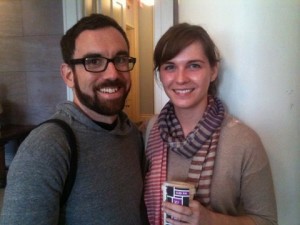

4:00 P.M. Truth Versus Memory.
Myla Goldberg (The False Friend), Téa Obreht (The Tiger’s Wife), and Randall Robinson (Makeda) read from their novels in the opulent, gilded Borough Hall Courtroom. While waiting to begin, Goldberg looked stern and scary, but then out came her reading voice: like the best mother reading the best story. She even did voices, leaning out of the mic so one teenage character could yell to another, “I hate you!” Then she calmly sneaked in some wisdom, eyeing us levelly and intoning, “’I think therefore I am’ is too vague. We are because we remember.”
Téa Obreht read next, after patiently waiting through the long list of her accomplishments: youngest “20 Under 40” writer, youngest winner of the Orange Prize, debut novel instant NYT bestseller. I should have been jealous enough to despise her, but her work was too good. Example: “It is a sad sight, because as far as I can see, this man has done nothing to deserve being shot in the back of the head at his own funeral, twice.”
Randall Robinson brought us back solidly to fiction’s relation to memory, speaking of slavery as, “the lethal opaque space beyond which blacks had no history or story,” then reading from Makeda, in which the protagonist has the ability to reach back through that space by reliving past lives.
Among other topics, the moderator raised that familiar spectre of “digitalization in culture,” and how that might affect how characters encode memory. But the discussion didn’t go far, because everyone frankly stated that they avoid the issue entirely. Goldberg proclaimed, “I’m a Luddite!” Obreht shrugged. Robinson said, “Until recently, I thought tweeting was a speech impediment!” But he can be forgiven, because he lives on a Caribbean island. (SP)
1. Some of the crowd in the St. Ann and the Holy Trinity Church. 2. One of many lighthearted moments in the serious discussion shared between Harold Augenbraum, Wallace Shawn, Deborah Eisenberg and Fran Lebowtiz.

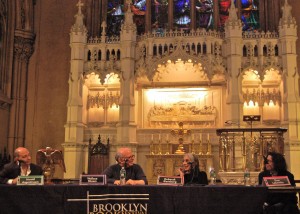
4:00 P.M. Presented by the National Book Foundation and BAM’s Eat, Drink and Be Literary-Defining the Moment: USA 2011: Where are We?
The crowd was understandably aggressive in the St. Ann and the Holy Trinity Church. As the recent documentary Public Speaking proves, listening to Fran Lebowitz is a hilarious, guilt-inducing and revelation-inspiring experience. Seeing her for free, riffing on a topic as vague as “Defining the Moment: USA 2011: Where are We?” alongside Wallace Shawn, Deborah Eisenberg and moderator Harold Augenbraum of the National Book Foundation? That is a standing-room only guarantee.
“It’s always nice on a Sunday afternoon to invite four Jews into an Episcopalian church,” Augenbraum began, and nice it surely was, if not the most intensely, hilariously depressing and leftist panel I’ve ever been to. Being one of the white, relatively affluent, young and liberal members of the audience, I can’t say it was a pleasant experience to know that these three “wise men” were telling it like it is and shaming my generation while they did so. Despite wanting to shrink down in my pew for the sake of my own political ignorance, I couldn’t help but wish the crowd was all as young as me. Everyone should be honored with a good talking-to by Fran Lebowitz.
As much as I want to address the eloquent and sweet contributions of Shawn and Eisenberg, even they allowed Lebowitz free reign to rant. Some choice quotes include:
-In reference to the republican party, “They’re morons, they’re bad, and they’re wrong.”
-“Some people are good at making money. Most aren’t. This bodes well on most people. What’s required to become rich is to be unhampered by ethics.”
-“There are twelve people who own everything. That’s not a country, that’s a country club.”
-“What has replaced factories in the Midwest? Meth labs and mega churches. It goes New York, meth labs and mega churches, LA.”
In general though, as was repeatedly pointed out, they were speaking to a liberal audience (as one can assume Brooklyn Book Festival attendees to be). We all know what is wrong with our country — everyone has been de-educated, the youth can’t be bothered. The real question, which even these three incredibly intelligent thinkers can’t even begin to answer (although you can bet that Lebowitz will certainly try) is: What can be done? (SL)
1. Diana ossana and Larry mcmurty, who factor in the cost of buffalo extras when they write screenplays about the west. 2. Siblings! Guy and Emily Pettit held down the jubilat table.


4:00 P.M. Larry McMurtry and Diana Ossana in Conversation
There are many reasons to love Larry McMurtry. Among them, on Sunday at the Bookfest, was his tie — it was blue, monogrammed with two yellow H, and reached precisely halfway down his chest. It was the neckwear equivalent of a shortbus, and like him, it was brilliant.
He was in conversation with Diana Ossana, his longtime work partner, at the St. Francis Theater. Together they have written two books and about 35 screenplays, including one for Brokeback Mountain. Ossana initially had to do a bit of arm twisting to get McMurtry to read Annie Proulx’s “little story” on which they based the screenplay. “I don’t read short fiction because I can’t write it,” McMurtry explained. “It’s irritating.”
The duo started to collaborate when McMurtry arrived at Ossana’s house in Arizona for a short stay, got depressed and proceeded to pass every day on her couch, staring at the mountains. After about three years, Ossana suggested they start a screenplay on Pretty Boy Floyd to snap him out of it. “But I tricked her into writing it with me,” McMurtry said. “And I’ve been tricking her ever since.”
It’s a rare thing to see two people who have hit the sweet spot between criticism and creativity. It was on exhibit here, as was a distinctly Western stoicism that doesn’t beat around the bush because, half the time, there’s none on the horizon anyway. Hearing them speak made me miss open road and wide spaces. Their newest baby, a pilot for a show called “Texas,” is set in that landscape. They kept the details close. “It’d be a story Rick Perry would tell you, if he were inclined to tell one,” McMurtry said.
McMurtry has an upcoming article on Perry in the New York Review of Books that might shed some light on the kind of yarns he thinks Perry favors. He’s in the processes of writing it, or will be soon, he said, “if I can find a workable typewriter.” (LRS
1. John Burnham Schwartz, Jennifer Egan, and Timothy Houlihan brought the laughs 2. The McSweeney’s table: Adam Krefman, Max Fenton, and illustrator Amy Jean Porter.


5:00 P.M. Unholy Paths to Redemption
Even though no one understood the panel topic and the panel itself was cut short due to a late start, listening to Jennifer Egan (A Visit from the Goon Squad), James Hannaham (God Says No), and John Burnham Schwartz (Northwest Corner) discuss their craft was the perfect way to close out this year’s Book Festival.
Since there was only time for a few questions, moderator Timothy Houlihan urged the audience to be thoughtful. Here are the authors’ quotable responses to the question, “Is it necessary for main characters to be likable?”
– James Hannaham: I created a character whose fatal flaw is that he wants to be liked too much. Characters don’t have to be likable, but they must be compelling.
– John Burnham Schwartz: Rather than likable or unlikable, what we’re really interested in are interesting human beings.
– Jennifer Egan: What I enjoy about writing is understanding the logic of actions that seem illogical and alienating. It’s satisfying to be on the inside.
And here’s some bonus advice for the aspiring writers out there: try branching out from first person point of view. The three panelists agreed that it has become pointlessly overused, and Egan further explained that she expects “rewards for being limited to this point of view. More and more I feel I’m being limited without reaping any benefits.” (LD)
***
– Lauren Dlugosz loves Brooklyn and books.
– Patrick Gaughan’s work can be read in The Brooklyn Rail and PeopleHerd. He pursues his MFA at Brooklyn College.
– Julia Jackson writes fiction and is the editor of Electric Dish. She has an MFA from Brooklyn College.
– Sarah Lerner is a freelance event coordinator for the L Magazine. She contributes art and film reviews to Time Out New York.
– Sarah Perry is working towards an MFA at Columbia University. She writes memoir and short-short fiction.
– Lisa Riordan Seville is a writer and reporter in Brooklyn.
– John Zuarino is a writer and editor living in Brooklyn. He’s aware that this is true for many in Brooklyn.







